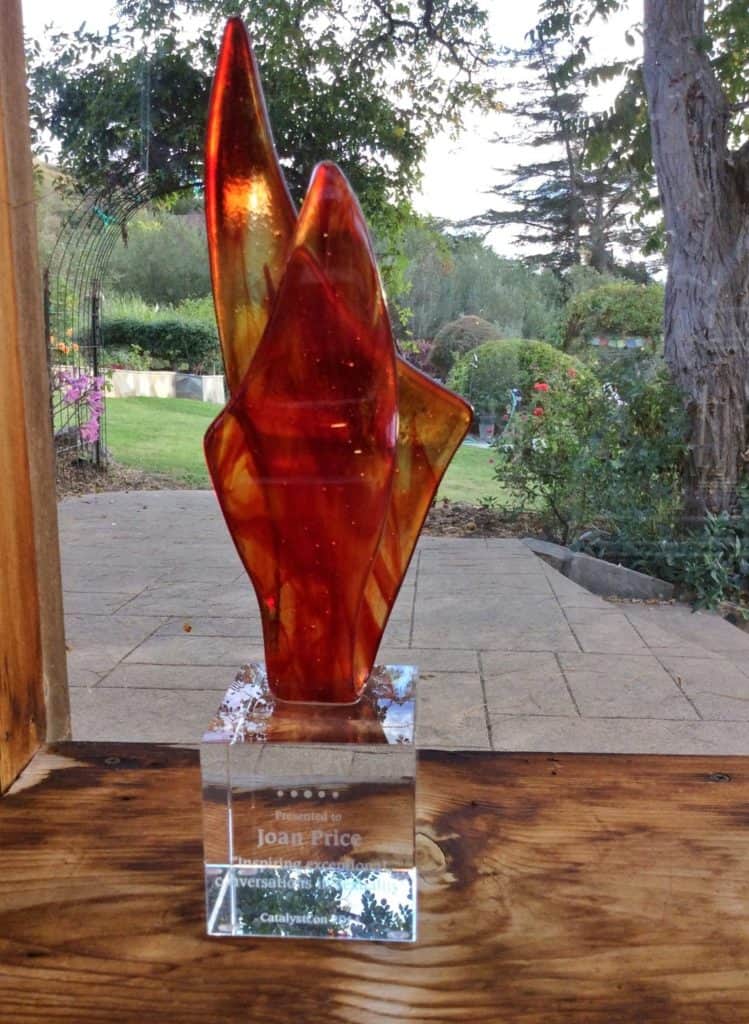Posts Tagged ‘sexuality conferences’
CatalystCon West 2014: Catalyst Award!
CatalystCon – Sparking Communication in sexuality, activism and acceptance is an amazing conference that happens twice a year: once in Washington, DC and once in Los Angeles. If you attend, you’ll never forget it.
The presenters and attendees are sex educators, bloggers, authors, researchers, professors, sex workers, adult entertainment performers, therapists, and anyone else who has a commitment to sharing in the conversation about sexuality education and activism.
You’ll meet legends in the field who paved the way to the kind of sexual liberation most of us in the US enjoy today. You may find yourself sitting next to a porn star or an erotica writer who sparked your own sexual awakening. You’ll get so much new information and so many diverse points of view that your brain and heart will expand.
CatalystCon feels like my world — a loving world in which sexuality is celebrated, and all sex-positive viewpoints and consensual behavior are accepted. I attend regularly and I give a presentation (or two) about senior sex each time. Even when I’m the oldest person in the room, I feel warmth, acceptance, and genuine interest in what I have to say.
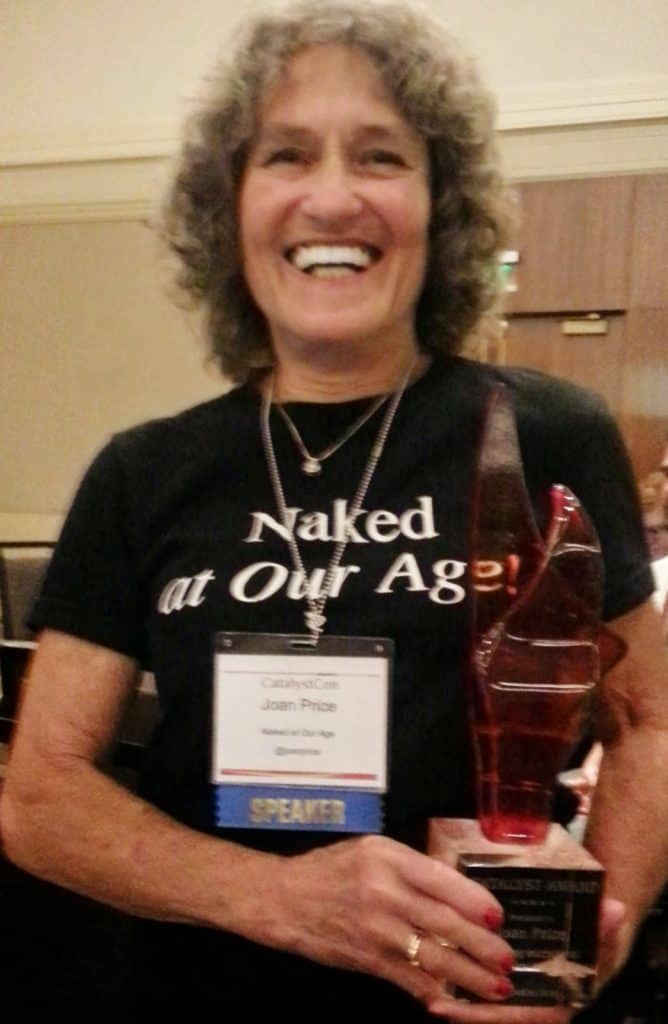 This time, there was an additional surprise for me: I received the Catalyst Award “for inspiring exceptional conversations in sexuality”! I can’t remember what organizer Dee Dennis said about me when I rose to accept the award (I had absolutely no idea in advance!) — all I remember is looking out at 300 people who were standing, applauding, and smiling at me.
This time, there was an additional surprise for me: I received the Catalyst Award “for inspiring exceptional conversations in sexuality”! I can’t remember what organizer Dee Dennis said about me when I rose to accept the award (I had absolutely no idea in advance!) — all I remember is looking out at 300 people who were standing, applauding, and smiling at me.
Here is the description of the purpose and mission of this conference from http://catalystcon.com/:
CatalystCon is a conference created to inspire exceptional conversations about sexuality. It is about reaching out and stimulating those who attend to create those important conversations in their own communities, changing how we as a society talk about and treat sexuality. It is about stimulating the activist that is within all of us and sparking transformation in the way our friends, neighbors, children and even politicians discuss one of the most important aspects of humanity.
This is a conference meant to energize, enlighten and exhilarate. It is a conference where everyone is welcome, everyone is respected, and everyone is encouraged to share their knowledge and experiences. As the struggle continues over issues relating to equal rights, access to health care, and sex education, it is more important than ever to come together and have these important conversations on all areas of sexuality.
The fundamental principle of CatalystCon is that knowledge is power and sharing that knowledge is the first spark in igniting change.
Do you see why winning the 2014 Catalyst Award feels to me like one of the most important honors ever? See why my smile takes over my entire face?
If you can attend in the future, please do. You’ll be changed by it: listening to, learning from, and networking with the most interesting people you’ll ever find in one weekend of sharing information and attitudes about sexuality.
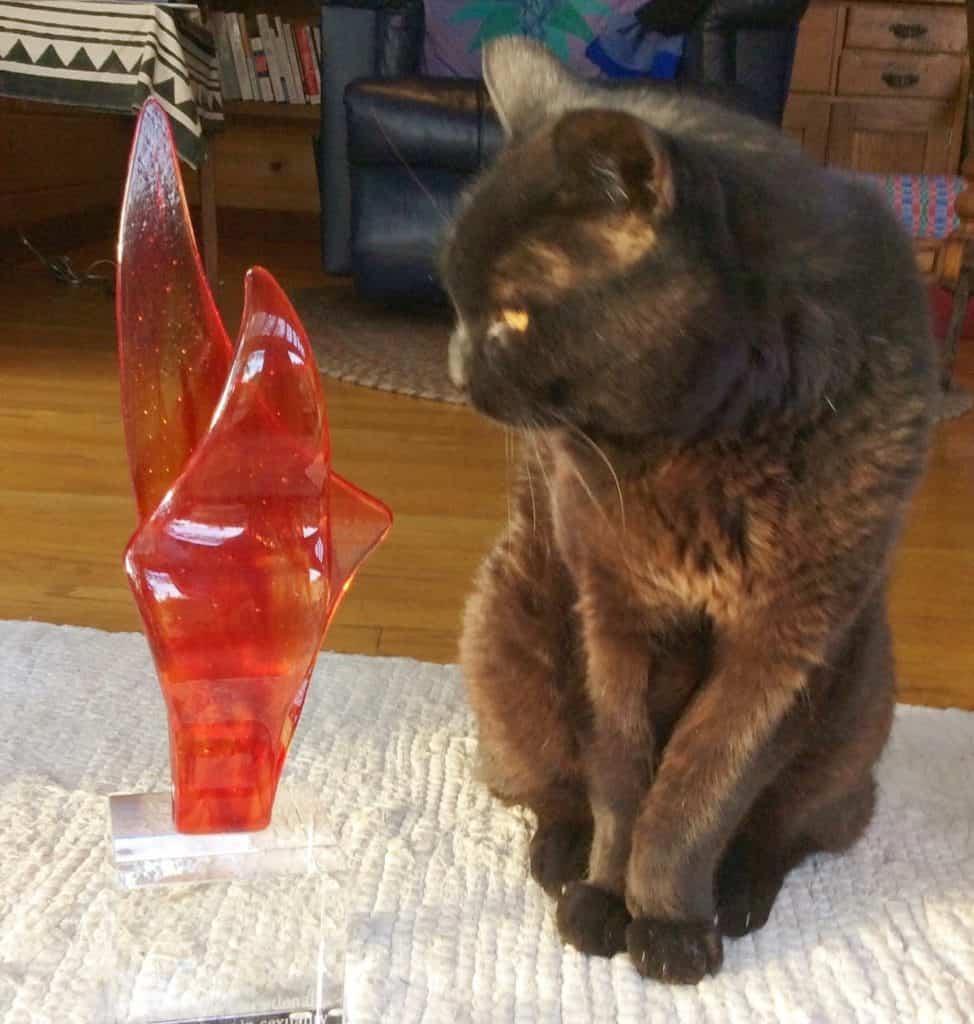 I’ll write more about what I learned from the presenters in another post, coming soon. The conference really wasn’t “all about me,” and neither was my enjoyment of it. I just had to share this much right away!
I’ll write more about what I learned from the presenters in another post, coming soon. The conference really wasn’t “all about me,” and neither was my enjoyment of it. I just had to share this much right away!
“Warm apple pie”: wisdom from Paul Joannides, AASECT 2014 (part 1)
What do you imagine happens when a professional organization of sex therapists, educators, researchers, and professors spend a weekend together in Monterey, California? That’s right – they talk about sex, learn about the latest sex research, listen to presentations by masters in the field, network and share resources, and take copious notes.
I had the pleasure of being among them at the annual conference of the American Association of Sexuality Educators, Counselors and Therapists (AASECT), June 5-8, 2014. (This is the organization that gave Naked At Our Age the 2012 Book Award!) The weekend was packed with information.
One of my favorite presentations was a spirited and savvy slide-show illustrated talk by Paul Joannides, Psy.D, author of the excellent self-help guide for young people, Guide to Getting It On! A Book About the Wonders of Sex. His presentation — usually given to college students — was entitled “I Wish My Clitoris Was Bigger, So My Boyfriend Could Find It.”
The title is, of course, ironic. Young people exploring sex may have heard that the clitoris has thousands of nerve endings, but they (and we?) have little understanding of the structure of the clitoris. It’s not just the little nubbin that’s erect and usually visible when aroused.
 The bigger issue, of course, is how, when, and where to give the clitoris the attention it needs. Since every clitoris owner gets pleasure in a different way, it’s up to her to discover what works for her and convey it to her confused but willing partner.
The bigger issue, of course, is how, when, and where to give the clitoris the attention it needs. Since every clitoris owner gets pleasure in a different way, it’s up to her to discover what works for her and convey it to her confused but willing partner.
- “No matter how many women you’ve been with, the first time you’re between the legs of a new woman, it feels like warm apple pie.”
- “He thinks, ‘I have no idea what I’m doing.’ She thinks, ‘I can’t tell him because he’s a guy and he’s supposed to know.’”
- “Even the best partners are clueless about your amazing vagina. It’s your job to teach him and his job to learn.”
- “85% of the women who have orgasms during intercourse need a clitoral assist, not through thrusting alone.”
- “The single most damaging aspect of porn is the expectation that the guy is supposed to automatically know how to please a partner. That’s a toxic idea.”
- “Because she’s having intercourse [in porn], and that part’s real, you forget that she’s faking the pleasure.
- “For some reason, porn actors do not have a gag reflex. That must be what they go to porn school for.”
- “When it comes to sex, we’re always a work in progress. We’re changing from the day we’re born until we’re really old.”
Sex after 50 Applies to All Ages: Guest post by Penny
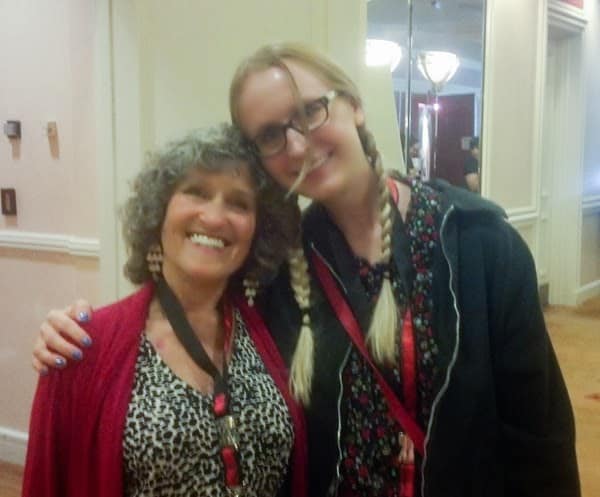 |
| Joan and Penny |
Note from Joan: CatalystCon West 2013 was filled with amazing educators, new information, and a sense of community that I wish we could all feel everyday, everywhere. Normally I would write a synopsis of this conference, sharing what I learned.
But this time, I give the floor to Penny, a remarkable, 26-year-old sex blogger, who attended the session I gave: The 5 Biggest Myths About Sex and Aging. She started this guest post on the plane going home, she told me, tearing up as she wrote it. I’m proud to share it — and her — with you here. With allies like Penny, we’ can indeed change the world.
attitude that I was going to take a leap and learn about something that doesn’t
apply to me, at least not yet. I told Joan this when we ran into each other in
the hall before her panel, and she smiled and said with a chuckle, “Maybe
you’ll find what I have to say useful in about 30 years.”
But I quickly
realized that what Joan was teaching in her panel didn’t only apply to people
aged 50+ — it was relevant to anyone, including myself now, at age 26.
aging was the idea that what felt good to us in the past should still make
us feel good now, and that when it doesn’t, there must be something wrong, and
we might as well just give up.
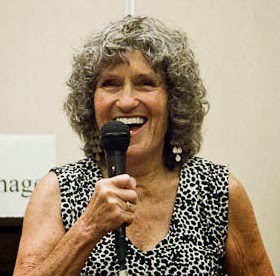 |
| photo by Roman Roze |
She explained that as our bodies change with age
later in life, the ways we experience arousal and pleasure change as well, and
that this is perfectly normal. She went over specifics, like the differing
needs that seniors may require in a toy, such as very strong vibrations, the
ability for the toy to last long enough to endure a longer cycle of arousal,
ergonomically comfortable designs for arthritic hands, easy to use controls,
etc.
people outside of my age demographic, but the underlying message was universal:
We must remember that sexuality is fluid and that it changes. Our
bodies change, our lives change, our needs and wants change. Self-exploration is a continuous process.
I may not be 50 yet, but what turned
me on when I started having sex at age 16 is dramatically different from what
turns me on now. My challenges with arousal are not the same as senior
challenges, but they’re there. Some weeks I feel down and emotional, and I
don’t want to take the time to give myself the self-care that I need. I have moments when I think, why isn’t this working like
it usually does? Why can’t I just orgasm like I usually do?
myself the compassion I would give a friend. If someone came to me and said
something wasn’t working for them, I would encourage them to keep trying
because they deserve pleasure. I would try to help them find new ways to
experience arousal and suggest new toys and techniques. I would also tell them
that there is nothing wrong if something just isn’t working right now, and that
pleasure and orgasms don’t always come easily.
Everyone deserves that encouragement
and support. We must allow ourselves to exist as we are right now, instead of
trying to conform to what society expects of us or even what we expect of ourselves.
because we’ve changed, and we feel like we aren’t ourselves anymore, everything
Joan discussed was not only relevant to seniors, but to
everyone. The importance of communication between partners, adaptation to
change, making time for pleasure and practice, and continual commitment to
self-care, sexual health, and sex education are always important.
about her grief in losing her love and partner. Her words shook me deeply, and
as tears streamed down my cheeks, my sniffles were echoed by a woman sitting
near me. Grief is incredibly personal, and I cannot pretend to know what Joan
has gone through, but in that moment I felt like her grief was somehow also
mine. Grief for her loss, for everyone I’ve lost, and for myself and the deep
fear I don’t usually even realize that I carry with me: that I am alone, that
nothing is certain, and that any day could be my last or my partner’s last.
strength. She said that what lives on after us is what we pass on to others,
what we give to people, what we share, our love and compassion. In that way,
she said, we become immortal. I’m often so wrapped up in my own needs, wants,
concerns, challenges, and privileges that I forget to seek out others’
experiences, to listen as much as I speak, and to share what I have.
her cause, to speak out against ageism, to stop and say, “That’s not funny,” if we hear malicious, ageist “jokes,” and to tell
people that they are beautiful exactly as they are. In return, she offered up
her own voice, to help us in whatever injustices we battle.

Her words echoed
Yosenio V Lewis’s speech from the Opening Keynote, when he called us to take on
someone else’s cause because it is our cause as well, to come together instead
of staying in isolated groups, to collaborate and realize that we are all
ultimately fighting for the same things: love, compassion, and acceptance.
Texas. She explores sexuality creatively through her blog Penny for Your (Dirty) Thoughts,
which is known for its variety of writing, unique sex toy photography, and
erotic self-portraiture.
Adult Sex Ed Month: HuffingtonPostLive, AASECT conference, and a new senior sex book
 June has been declared Adult Sex Ed Month (#AdultSexEdMonth) by Ms. Quote
June has been declared Adult Sex Ed Month (#AdultSexEdMonth) by Ms. Quote(@GoodDirtyWoman on Twitter) who blogs at A Good Woman’s Dirty Mind. This idea caught on, and this month, hundreds of posts designated #AdultSexEdMonth from sex educators and bloggers appeared all over the Internet. View the list with links here.
In my world — advocating for senior sex and educating about older-age sexuality — every month is Adult Sex Ed Month. This month has been particularly fruitful.
This month, I participated in a Huffington Post Live event titled “How Old Is Too Old To Have Sex?” with fellow panelists Ashton Applewhite, Walker Thornton, Sidney Schwab, and Ken Solin, hosted by Abby Huntsman. Of course the answer to the question in the title is obvious to us (though not obvious to Abby, until we raised her consciousness), but you’ll find the discussion interesting even though you know the answer! Watch it here:
***

The annual conference of the American Association of Sexuality Educators, Counselors
and Therapists conference always makes my brain swell with new information and ideas from sex educators who are trailblazers in the field. Counselors, therapists, sex educators in community or medical settings, and other people who care about your sexual knowledge and enrichment gather to learn from the leaders. Then people like me come home and spread it around – to people like you.
As always, it was impossible to attend all the sessions of interest, and there’s no way I can share all of the 25 pages of single-spaced notes that I took on my laptop, no matter how many blog posts I write. But here are some highlights and tips that are especially relevant to our age group:
- Some sexual issues are psychological; some are medical or physiological. But even when it’s a medical issue, a sex therapist can be important to help you work with whatever is going on. Medical sexual issues affect your sense of self and your relationship. “Any pharmacotherapy for sexual dysfunction should occur within the context of sex and relationship therapy.” (Ricky Siegel)
- One more good reason to quit smoking: Nicotine has been shown to decrease blood flow to the penis and increase venous outflow from the penis — in other words, less ability to get and maintain an erection. (Ricky and Larry Siegel)
- Women with vulvar or vaginal pain have a difficult time getting the pain diagnosed and treated effectively. Possible causes of pelvic pain are varied, and with the wrong diagnosis (or no diagnosis!), the wrong treatment follows. Look for a three-pronged approach: a sexual medicine physician, a pelvic floor physical therapist, and a certified sex therapist, such as used by the Summa Center for Sexual Health in Akron, Ohio. (Kimberly Resnick Anderson)
- Pelvic floor physical therapists are trained to do internal evaluation of the pelvic floor muscles — evaluating muscle function, strength, tone, and any points of tenderness. Regular physical therapists are not trained to do this. (Amy Senn)
- Men with low libido: Anxiety, mood, relationship, and religious factors affects libido. “First know what’s going on in the relationship before throwing medication at it.” (Larry Siegel)
- “Nerve sparing” prostate surgery is “a bit of a misnomer.” Erectile nerves on the outside of the prostate are very difficult to see and avoid during surgery. “The prostate is deep in the pelvis, and they go pushing around with stainless steel instruments. If cauterizing instruments are anywhere near nerves, it damages them for life. Nerves recover from the pushing and pulling – it takes a long, long time. Nerves go into shock and stop sending message to blood vessels to relax and let blood in.” (Anne Katz)
- “Sexual arousal requires healthy blood flow for everything else to work. Otherwise, nothing happens. Take a 15 minute walk with your partner before sex. It will prime the pump.” (Ellen Barnard)
- After treatment for female genital cancer, using a vibrating wand internally will reduce scar tissue. “Vibration directly to the scar tissue starts breaking up that scar tissue, allowing it to expand, become more comfortable, and allow penetrative sex if we want it.” (Ellen Barnard)
- After cancer treatment, start getting to know “what is”: “What feels good? What doesn’t feel good? What’s numb? What’s painful? How does arousal happen? What does it take? How does orgasm happen and feel? When during the day do I have energy?” (Ellen Barnard) You need to learn this for yourself before you can teach your partner. (JP: This applies to aging in general, also.) A Woman’s Touch has excellent educational brochures for both men and women online at no cost, for example, Healthy Sexuality After Cancer. Visit www.sexualityresources.com, see the Educational Brochures link in the upper left hand corner of the menu bar for a complete selection.
The huge news this month for me as a senior sex educator was an invitation from Cleis Press to write a book for them: The Ultimate Guide to Sex after Fifty! I’m thrilled to have a new book to write on my favorite topic, and I’m proud to be part of the fabulous Ultimate Guide collection of sexuality guidebooks. You can be sure you’ll hear more about my new endeavor as it unfolds.
Meanwhile, if there’s a topic you want to be sure that I cover in this new book, please either post it as a comment here or email me. I love to hear from you. I’m too busy to promise to answer all your questions in detail, but I try to acknowledge your email and point you in the right direction. I admit sheepishly that I have about 400 unanswered emails waiting. If one of these is yours, I thank you for your patience! (I do give private, educational consultations answering your questions by phone or Skype for a modest fee — email me for more info about this.)
